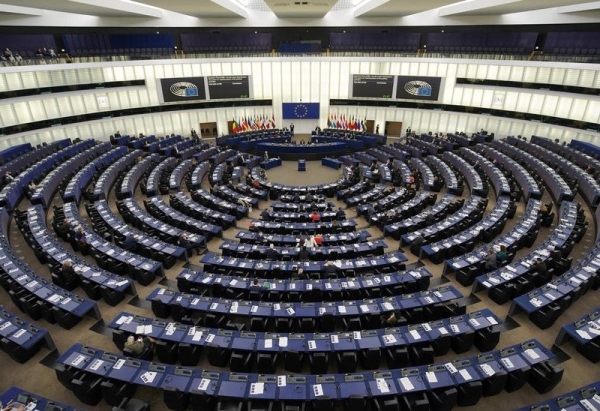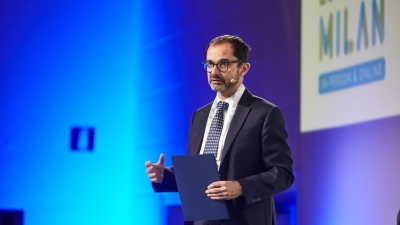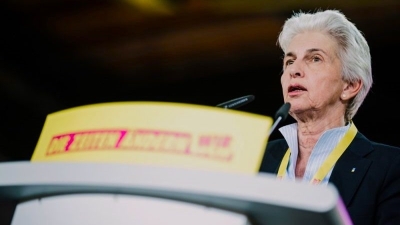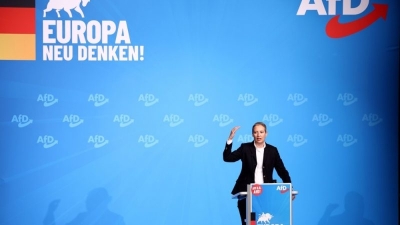Metsola supports centrist approach to combat crises, political extremism ahead of EU elections

European Parliament President Roberta Metsola said she supports a centrist approach to combat crises and political extremism ahead of European elections, calling on citizens not to vote for extremism out of frustration in an exclusive interview with Euractiv.
The Maltese politician, who became president in January 2022, will run for elections at home under the banner of the centre-right Nationalist Party, hoping to be reelected as an MEP. But so far, Metsola has remained tight-lipped on whether she will run again for the European Parliament presidency.
When asked by Euractiv, she said she would first focus on the electoral campaign in Malta. “I will present myself to my citizens and ask whether they would like to place their trust once again in me”.
A European Parliament president’s mandate is two and a half years. However, there have been previous cases in which a president was re-elected for a second mandate, being in office for five, as happened with the German socialist Martin Schulz and Italian centre-right Antonio Tajani.
But aside from her political ambitions and origins in a centre-right conservative party, Metsola clearly backed a centrist approach and called on voters not to fall prey to extremes.
“We had a pandemic, we had an energy crisis, a cost of living crisis. These are things we need to address. And therefore, I am addressing them from the centre of the political spectrum, which is where I am from,” Metsola said, underlying that this approach can help “in countering that narrative for citizens who might feel that they have no choice but to go to the fringes of the political extremes”.
“We have perhaps not explained enough. Our responsibility also means cushioning the social and economic impact of our legislative proposals. With a very pragmatic approach, looking at what will work when majorities move in this house,” Metsola told Euractiv during the video interview.
After the elections, the political groups will re-constitute their shape and relations with each other to start the new legislative mandate.
On the possibility of having a new parliament with an increased presence of the far-right, Metsola said that, at the moment, she does not want to “speculate” but believes that she must convince citizens not to choose extremist parties.
Electoral topics
This will be Metsola’s fifth European elections, she told Euractiv, adding that from her experience, the elections have been dominated by “climate, migration, jobs and growth”.
“And even now, as I go from country to country, you will see that these are the topics that people want Europe to offer solutions about,” Metsola said.
The president also assessed some of the legislative proposals discussed and voted on by the European Parliament during her time in office.
“We have delivered extremely ambitious climate legislation. We are now seeing, of course, a pushback from certain sectors. I understand the concerns. How are we going to react to that? This will mean that if we react in time, we could give those frustrated citizens voters the fact that they can continue to trust in the centre of the political spectrum,” Metsola explained.
In these weeks, the EU electoral campaign has started to heat up with farmers protesting across Europe, putting EU legislation affecting the sector at the centre of their grievances.
Among other reasons farmers are taking to the streets is the application of some current and future EU legislative files. The most delicate points regard, for instance, the management of the green transition and the investments in the agricultural policy.
On the migration pact, Metsola said that it is not perfect, but the EU delivered, as asked by its citizens, a legislative solution.
“We will deliver on the largest-ever migration pact. Just before the European elections in 2019, every single citizen told us the EU needs to deliver a solution on migration. Is it perfect? Of course not. But there is a legislative solution to it, and we have found it”.
The electoral system
Regarding the European elections, there are only a few minimum provisions at the EU level, while specific rules are set at the national level.
“We have different electoral systems in each country. In some countries like mine, it is an open vote. People vote personally for their members of the European Parliament, and therefore, there is a very strong connection between the voter and the members,” Metsola explained.
“In some other countries, it is traditionally based on that so-called head of the list, in German ‘spitzenkandidat’…I strongly believe in it,” the president said.
The spitzenkandidat is used to identify the leading candidate at the EU level. According to the current treaties, the leading candidate of the European political family that got the majority of votes can be considered for the election as European Commission President.
Metsola said that electing the leading candidate of the main party as EU executive president gives “democratic legitimacy at the EU level”.
“It worked very well in 2014. It worked less well in 2019. For 2024, it will be a big question whether that will work”.
The president referred to Jean-Claude Juncker’s election as president of the European Commission in 2014, who was the leading candidate of the European People’s Party, which got the majority of votes. In 2019, the EPP candidate Manfred Weber did not take office; instead was taken over by President Ursula von der Leyen.
After that event, some member states and parties watered down the legitimacy of such a process.
EU countries to reject Spitzenkandidaten and pan-EU election lists
EU governments are set to formally kill off plans for transnational lists and Spitzenkandidaten, or lead candidates, at the next European elections in 2024.
It is not legally binding in the selection process of the European Commission president to elect the spitzenkandidat of the main party. In the negotiations, the head of states decided unanimously, while in a second moment, the vote of confidence occurs in the European Parliament. In 2019, Von der Leyen was elected with a slim majority.
“The different political parties are at the moment nominating different individuals….No doubt that candidates are pro-European, and we really show where they want Europe to go for the next five years,” Metsola told Euractiv.



